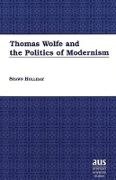Read more
Once one of the most popular fiction writers in all of American literature, Thomas Wolfe now stands in a tenuous position in the American literary canon. This book combats the academic and critical inertia that currently surrounds Wolfe by exploring his complex relationship to modernism. The experimental nature of Wolfe's fiction, his troubling associations with other writers and artists, his complicated publishing practices, and the development of his late political conscience are analyzed to reestablish his importance to this historically avant-garde literary movement and to twentieth-century American literature.
Report
"The conventional critical wisdom these days virtually reduces Thomas Wolfe to the status of an idiot savant who poured out words that editors Max Perkins and Edward Aswell shaped into literature. Shawn Holliday compellingly challenges this view, argues that Wolfe's editors did his work more harm than good, and makes a persuasive case for a reevaluation of Wolfe's place among modernist writers. 'Thomas Wolfe and the Politics of Modernism' should be a welcome addition to every college library and must reading for any scholar interested in taking a fresh look at America's modernist canon." (John Teel, Marshall University)
"Shawn Holliday places Thomas Wolfe on the literary landscape of modernism in this clear and convincing study. Scholars and other patrons of libraries, bookstores, and online services can explore this critical map to find out more about Wolfe as well as other writers including William Faulkner, Henry Miller, Jack Kerouac, Edward Abbey, Ray Bradbury, and Pat Conroy." (James W. Clark, Jr., North Carolina State University)

